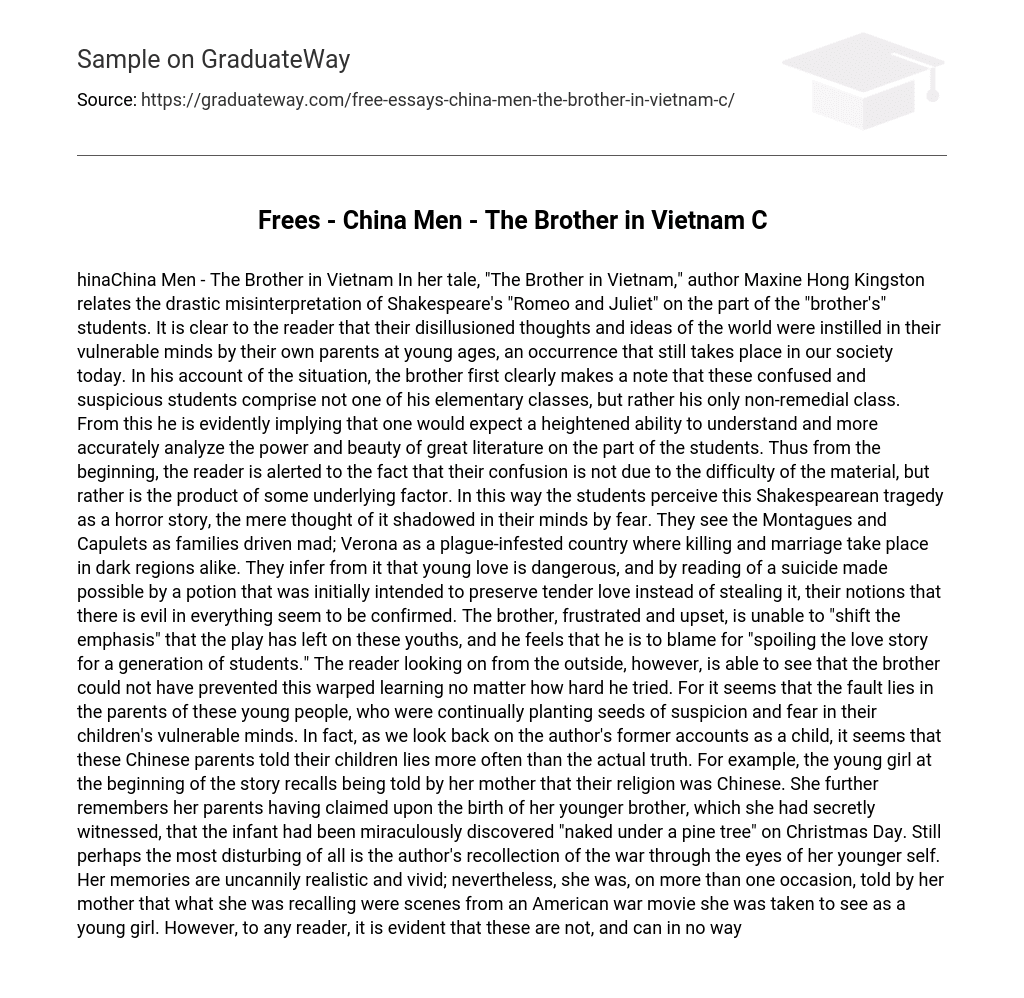hinaChina Men – The Brother in Vietnam In her tale, “The Brother in Vietnam,” author Maxine Hong Kingston relates the drastic misinterpretation of Shakespeare’s “Romeo and Juliet” on the part of the “brother’s” students. It is clear to the reader that their disillusioned thoughts and ideas of the world were instilled in their vulnerable minds by their own parents at young ages, an occurrence that still takes place in our society today. In his account of the situation, the brother first clearly makes a note that these confused and suspicious students comprise not one of his elementary classes, but rather his only non-remedial class.
From this he is evidently implying that one would expect a heightened ability to understand and more accurately analyze the power and beauty of great literature on the part of the students. Thus from the beginning, the reader is alerted to the fact that their confusion is not due to the difficulty of the material, but rather is the product of some underlying factor. In this way the students perceive this Shakespearean tragedy as a horror story, the mere thought of it shadowed in their minds by fear. They see the Montagues and Capulets as families driven mad; Verona as a plague-infested country where killing and marriage take place in dark regions alike. They infer from it that young love is dangerous, and by reading of a suicide made possible by a potion that was initially intended to preserve tender love instead of stealing it, their notions that there is evil in everything seem to be confirmed.
The brother, frustrated and upset, is unable to “shift the emphasis” that the play has left on these youths, and he feels that he is to blame for “spoiling the love story for a generation of students.” The reader looking on from the outside, however, is able to see that the brother could not have prevented this warped learning no matter how hard he tried. For it seems that the fault lies in the parents of these young people, who were continually planting seeds of suspicion and fear in their children’s vulnerable minds. In fact, as we look back on the author’s former accounts as a child, it seems that these Chinese parents told their children lies more often than the actual truth. For example, the young girl at the beginning of the story recalls being told by her mother that their religion was Chinese.
She further remembers her parents having claimed upon the birth of her younger brother, which she had secretly witnessed, that the infant had been miraculously discovered “naked under a pine tree” on Christmas Day. Still perhaps the most disturbing of all is the author’s recollection of the war through the eyes of her younger self. Her memories are uncannily realistic and vivid; nevertheless, she was, on more than one occasion, told by her mother that what she was recalling were scenes from an American war movie she was taken to see as a young girl. However, to any reader, it is evident that these are not, and can in no way be mere “scary movie flashbacks.” As a result, we are left asking ourselves why any parent would teach their children what they know is untrue. In the case of a war, it is somewhat easier to comprehend the desperation of parents to hold their families together from the tearing claws of battle. And if it will prove to be the only glue that will preserve the family structure, such lying seems more acceptable.
However, this same type of situation occurs even today, for example, when attempting to teach children about drugs and alcohol, “the birds and the bees, ” and other controversial topics. A great majority of parents are often cryptic in these necessary lessons while still others try to build a protective shield around their children. Do they really believe this is to the benefit of our youth? It is understandable to want to protect children from unnecessary evils, but sometimes in constructing walls around their worldly vision they are in all actuality cutting their children off from reality. It is so much healthier and helpful to confront these issues head-on, rather than trying to skirt around them.
In fact, in the long-run, as can be seen through the misinterpretation of “Romeo and Juliet” by the students, such avoidance of the matter at hand will often prove more harmful in the development of young minds. Through the various misconceptions of the children in her short story, “The Brother in Vietnam,” Maxine Hong Kingston allows her reader to see just how necessary truth is to the vulnerable minds of our youth.





